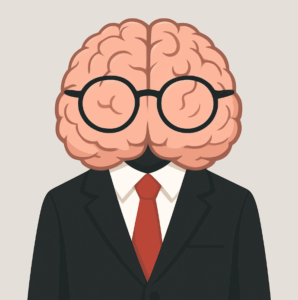When the Brain’s CEO Retires Early: Frontal Lobe Syndromes Explained
 The frontal lobes are often called the “CEO of the brain.” Just as a chief executive oversees strategy, planning, and decision-making in a company, the frontal lobes coordinate our most human abilities — judgment, self-control, problem-solving, and social behavior. When this “executive office” malfunctions, the results can be dramatic: a once-organized individual may become impulsive, apathetic, or socially inappropriate. Understanding frontal lobe syndromes isn’t just an academic exercise; it explains why changes in personality and behavior can sometimes signal a neurological crisis rather than a psychological one.
The frontal lobes are often called the “CEO of the brain.” Just as a chief executive oversees strategy, planning, and decision-making in a company, the frontal lobes coordinate our most human abilities — judgment, self-control, problem-solving, and social behavior. When this “executive office” malfunctions, the results can be dramatic: a once-organized individual may become impulsive, apathetic, or socially inappropriate. Understanding frontal lobe syndromes isn’t just an academic exercise; it explains why changes in personality and behavior can sometimes signal a neurological crisis rather than a psychological one.
A Case :
Mr. K, a 52-year-old bank manager, was once known for his sharp decision-making and calm demeanor. Over a few months, his family noticed unsettling changes. He would laugh loudly at inappropriate moments, make risky investments without reason, and forget simple tasks like locking the front door. At work, he struggled to plan meetings and often blurted out offensive jokes.
Neuroimaging revealed a tumor pressing on his orbitofrontal cortex. What his family witnessed was not simply “stress” or “midlife crisis” — it was the unfolding of a frontal lobe syndrome.
Why the Frontal Lobes Matter
The frontal lobes occupy nearly one-third of the human brain and act like the CEO of our mental company. They manage:
-
Decision-making
-
Planning and judgment
-
Personality and social behavior
-
Emotional regulation
-
Voluntary movement
Damage to different frontal regions produces distinct syndromes, often dramatic and life-altering.
The Big Three Frontal Lobe Syndromes
1. Dorsolateral Prefrontal Syndrome
-
What goes wrong: executive dysfunction.
-
Symptoms: difficulty planning, organizing, or shifting between tasks. Patients get “stuck” in rigid thinking.
-
Everyday example: a patient can’t cook a simple meal because they lose track of steps.
2. Orbitofrontal Syndrome
-
What goes wrong: inhibition and social filters.
-
Symptoms: disinhibition, impulsivity, emotional lability, inappropriate jokes, aggression.
-
Everyday example: a respected teacher suddenly begins shoplifting or making sexual remarks in class.
3. Medial Frontal (Cingulate) Syndrome
-
What goes wrong: drive and motivation.
-
Symptoms: apathy, loss of initiative, abulia, sometimes mutism.
-
Everyday example: a person sits silently for hours, not sad but completely unmotivated to act.
Other Clues to Frontal Damage
-
Primitive reflexes re-emerge (grasp, snout, palmomental).
-
Motor deficits if the motor cortex is involved.
-
“Utilization behavior”: compulsively using objects placed in front of them (picking up a pen and scribbling without being asked).
What Causes Frontal Lobe Syndromes?
-
Traumatic brain injury
-
Strokes
-
Tumors (like Mr. K’s case)
-
Neurodegenerative disorders (especially frontotemporal dementia)
-
Infections or demyelinating diseases
Diagnosis and Management
-
Assessment: clinical exam, neuropsychological testing, MRI/CT scans.
-
Management: depends on cause — surgery (tumor), rehabilitation, medications for behavioral symptoms, psychotherapy, and caregiver support.
Why It Matters
Frontal lobe syndromes blur the line between neurology and psychiatry. A successful banker may appear “immoral” or “lazy,” when in fact their brain’s CEO — the frontal lobe — has retired early. Recognizing the signs prevents misdiagnosis and helps families understand the sudden changes in their loved one.
Key Takeaway
When personality changes overnight, or judgment suddenly collapses, think frontal lobe syndrome. Sometimes the difference between a “midlife crisis” and a neurological crisis is just an MRI away.
About the Author
Dr. Srinivas Rajkumar T
Consultant Psychiatrist
Apollo Clinic, Velachery, Chennai
📞 85951 55808